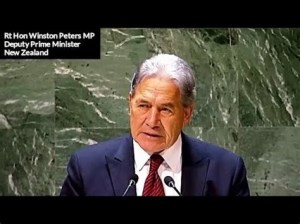A recent NZ Herald opinion piece continued the modernist narrative that in 1840 the chiefs did not agree to Crown sovereignty. Here is the alternative view I sent them, which they declined to publish…
Matthew Hooton wrote in the NZ Herald last week that “There’s no doubt that both Māori and Pākehā in 1840 understood tino rangatiratanga to be a bigger deal than kāwanatanga”.1 However whilst this is undoubtedly the modernist position on how we should interpret the Treaty, the historical evidence suggests something very different.
Article One of the Treaty states that the chiefs agreed to “give absolutely to the Queen of England forever, the complete Government (Kāwanatanga katoa) over their land”. This is the late Prof Sir Hugh Kawharu’s back-translation of the Māori text into English.2 Whilst many today prefer to ignore the strong and clear meaning of this Article, the chiefs in 1840 were under no such illusion. They quickly grasped the essence of what it meant. The British Crown would become the pre-eminent governing authority in these islands. Yes, their chieftainship over their lands and villages would be protected. But only within the context of the over-arching sovereignty of the Crown over all New Zealanders – including them.
How do we know this? Because they told us. We have historical accounts of the debate at Waitangi that record what various chiefs said. In particular William Colenso’s account is generally accepted as an accurate description of proceedings.3 It shows that the idea of coming under Crown authority was indeed a very big deal for the chiefs. In fact Kāwanatanga katoa was the prime focus of discussion and debate. And that little word katoa is an important clue as to why. It is rarely mentioned. But it means complete, all-encompassing, totally, without exception.4 It’s no wonder it focussed the minds of the chiefs on the issue of Crown authority.
Colenso’s notes showed many chiefs were initially reluctant to sign the Treaty, precisely because they understood it would establish an authority above theirs. Tareha replied to Hobson “We only are the chiefs, rulers. We will not be ruled over. What! thou, a foreigner, up, and I down! No”.5 Another chief, Te Kemara, opposed the Treaty because it would mean “the Governor to be up and Te Kemara down”.6 Other chiefs expressed similar sentiments both at Waitangi and other locations around the country where the Treaty was signed. In the Hawkes Bay one chief, Te Hapuku, even drew a diagram showing the Queen above the chiefs.7
These chiefs clearly did not see the Article Two guarantee of tino rangatiratanga as allowing them to retain unqualified chieftainship or “absolute sovereignty”, as Hooton and the modernists suggest. And taunts from local Pākehā settlers that the Treaty would make them slaves certainly wouldn’t have encouraged that idea.
In the face of such taunts the chiefs sought counsel from trusted Pākehā advisors. The French Catholic missionary Pompallier was, unsurprisingly, not an enthusiastic advocate for the Treaty. However he advised the chiefs that the decision was up to them, and the key question was “whether it is preferable for you to recognize and obey a great European chief, rather than to live as you have lived until now”.8 Henry Williams, the Anglican missionary who translated the Treaty, met with many on the evening before the signing. He later wrote that he explained again the Treaty, clause by clause, and how it meant “they would become one people with the English… under one Sovereign, and one Law, human and divine”.9
Nowhere in the historical records do we find any indication that either the chiefs or the Pākehā protagonists understood anything other than that Kāwanatanga katoa meant the Crown was being established as the pre-eminent governing authority in the land. This was the key question under debate. This was what the chiefs had to agree to – or not. The significance or meaning of the Article Two guarantee of tino rangatiratanga hardly even featured in the proceedings. Of course it was important. But it wasn’t the main question at stake.
As it transpired, after initial reluctance and doubt, most chiefs agreed to the Treaty. They did so not because of assurances of “equal partnership”, but because they were persuaded of the benefits that Crown authority would bring. These included law and order, peace between tribes, and increased opportunity for trade. Tāmati Wāka Nene for instance acknowledged Hobson would become “our Governor” and urged him to remain as “a father, a judge, a peacemaker”.10 Many others likewise invited Hobson to stay as Governor for both Māori and Pākehā. One was Tāmati Pukututu who accepted Hobson as “a Governor for me, for us, for all.” 11
These statements clearly don’t fit with the modernist narrative that the chiefs only agreed to the Governor having authority over Pākehā. However they are the historical facts. Hooton and the modernists need to engage with them, rather than ignore them. They also need to stop offering shallow interpretations of Te Kawenata Hou (the Māori New Testament).
It is true that this document would have had significant influence on how the chiefs understood the Treaty. In the 1830s Christianity had been widely accepted among Māori. Tens of thousands of copies of Te Kawenata Hou had been printed, and were eagerly sought. Hooton would have us believe it contributed to the chiefs understanding of rangatiratanga as “absolute sovereignty”.
However in Te Kawenata Hou the term rangatira is a general term for leadership. In contrast kawana is a very specific term used to denote governors who represent the authority of kings. To use Hooton’s example of Pilate – as the kawana (governor) he represented the sovereignty of the Roman empire in Jerusalem. He had the authority to tax and to execute judgement. The local Jewish leaders who wanted Jesus crucified had to get his permission. Those leaders are described in Te Kawenata Hou as rangatira. From this the chiefs at Waitangi would have quickly understood what was being proposed in the Treaty. And it certainly did not involve them retaining “absolute sovereignty”.
As we debate the future of the Treaty in our constitution we need truth-telling about our history. The assertion that in 1840 the chiefs did not agree to Crown sovereignty being established over all New Zealanders does not reflect the historical evidence. It is certainly true that the Treaty affirmed chieftainship. But any discussion about how to implement that today needs to align with the original Treaty vision. That involved chieftainship under Crown sovereignty – not in place of it.
References
1) Matthew Hooton, “Act achieves total victory on Treaty Principles bill”, NZ Herald 13.09.24
2) waitangi-tribunal.govt.nz – Prof Sir Hugh Kawharu Maori translation of Treaty
3) William Colenso “The Authentic and Genuine History of the Signing of the Treaty of Waitangi”, published in 1890 based on notes Colenso took at the time
4) Te Aka Maori-English Dictionary – maoridictionary.co.nz
5) Ibid Colenso page 24
6) Ibid Colenso page 17
7) Claudia Orange “The Treaty of Waitangi” 1987, page 81 – Te Hapuku’s diagram
8) Waitangi Tribunal “He Whakaputanga me te Tiriti: The Declaration and the Treaty” Wai 1040, 2014, page 368
9) Caroline Fitzgerald (ed) “Te Wiremu – Henry Williams: Early Years in the North”, Huia Publishers, Wellington, 2011, page 317
10) Ibid Colenso page 27
11) Ibid Colenso page 21









